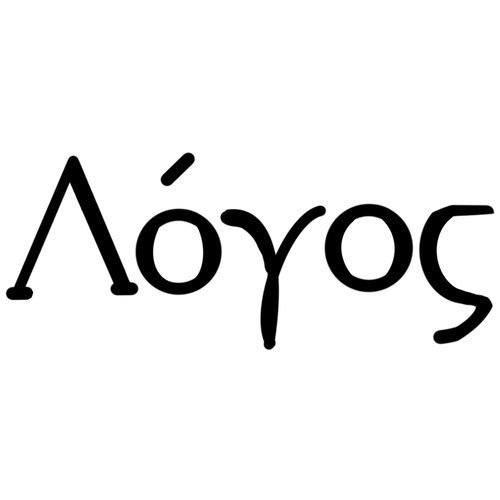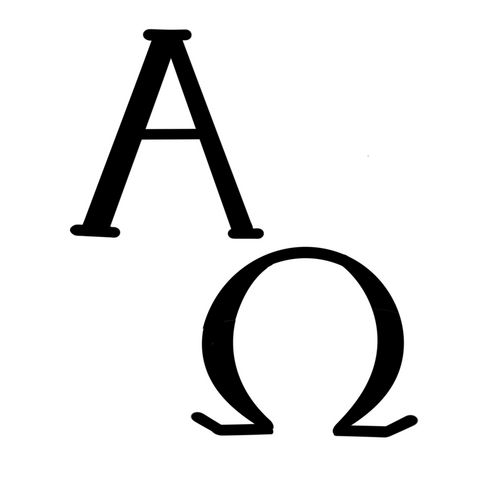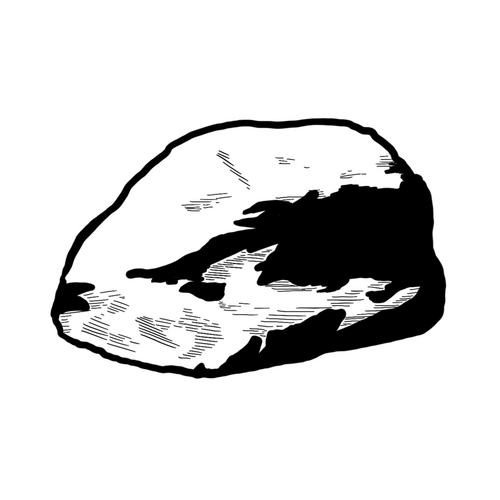
December 1
The Word (John 1:1)
The Apostle John, determined to demonstrate the deity of Christ in his Gospel account, thought it best to start “in the beginning.” No, not at the earthly birth of Jesus in Bethlehem, but in eternity past, where Jesus already existed as “the Word.” Taken together, these two phrases are designed to draw your mind back to the first verse of the book of Genesis (“in the beginning, God created...). In Genesis chapter one, the phrase, “and God said,” shows up ten times. It’s incredible to contemplate that God made everything there is, both material and immaterial, through the power of His spoken Word! In addition, John tells us that everything created was done through the express agency of the Word (Jesus); nothing was created by any other means! Can anything be loftier for us to dwell on than the creative act of the Word who spoke everything into existence? YES! Something grander awaits if we read further down into the text: “the Word became flesh and lived among us” (v.14). The same Word that spoke everything that there is into existence is the same Word that stepped down from glory and became a man. Knowing all that would be required of Him, the preexistent Word made His dwelling among mankind in order to bring many sons and daughters to glory (Heb. 2:10). The first step in Jesus’ immeasurable task of redemption started with humility, and that was not by accident. The Father’s plan of redemption from the very beginning would be accomplished through humble obedience; therefore, let us be of the same mind as Jesus (Phil. 2:5), and let us not treat the salvation that we have through Him with apathy, for it cost Him everything!
Additional reading: Philippians 2:5-10; Hebrews 2:5-18
Additional reading: Philippians 2:5-10; Hebrews 2:5-18

December 2
Immanuel (Isaiah 7:13-14)
King Ahaz, like all of the Kings of Judah, was brought to a crossroads of faith during his reign. Would he trust in the gods of the nations who lived in the land, or would he trust in Yahweh? Every king before and after him would be brought to a similar intersection, and every Christian faces that same dilemma: trusting God or trusting something else. When Isaiah presses on King Ahaz, he remains indecisive. Isaiah responds with these words: “...is it a small thing for you to weary men, but you will weary my God also?” In other words, it’s one thing to test man’s patience, but now you want to test God’s patience? Showing kindness and compassion to His people, God gives King Ahaz a sign in the form of a child. The very name of the child, Immanuel, was significant because it conveyed that God would be with his people. “I will be with you,” in its various forms, fills the pages of the Old Testament. It has always been a promise of God to individuals and to his people when they are faced with overwhelming circumstances. It should not surprise us, therefore, that the very first chapter of the New Testament reminds us that “God is with us!” (Matt. 1:23). Jesus as Immanuel, is never called this name outside this one verse in Matthew. However, the concept of “God with us,” actually shows up at the end of Matthew’s Gospel: “...I am with you always, even unto the end of the age” (Matt. 28:20). “God with us” is a reminder that He who revealed Himself to us in the Incarnation is the same He who will continue to be present with us as we carry the Gospel to the ends of the earth.
Additional reading: Matthew 1:18-24; Matthew 28:18-20
Additional reading: Matthew 1:18-24; Matthew 28:18-20

December 3
Root of David (Revelation 5:5)
Isaiah, Jeremiah, Matthew, and Romans have passages that remind us that Jesus’ ancestry is in the line of David. Other places in Scripture show us Jesus’ ancestry by means of genealogies (1 Chronicles, Matthew, and Luke). The many Messianic titles of Jesus, and prophecies concerning His coming, orient our focus forward. However, this passage in Revelation 5:5, names Jesus not in particular as an ancestor of David but as the very Root of David. It forces us to look back and ask the question, “how can Jesus be both the kingly descendant of David and the Root of David?” Perhaps this was the same enigma that Jesus highlighted in one encounter He had with the Pharisees in Matthew 22:41-46. Jesus asks about the identity of the Messiah’s son – whose son is He? The Pharisees give the standard answer: “He is the son of David.” But Jesus wasn’t satisfied and quotes Psalm 110 to show them a problem. He words it like this: “Since David called the Messiah ‘my Lord,’ how can the Messiah be his son?” (Confused yet?). The point is that Jesus was combining two concepts: the Messiah was the human Son of David, and He was also the divine Son of God. Later in Revelation 22:16, John says of Jesus, “...I am the Root and the Offspring of David.” Because of Jesus’ preexistence, He is the Root from which David himself will arise, and He is the offspring of David through means of His incarnation. In a rhyme, Jesus is both the root and the fruit (cf.Isa.11:1). Jesus is the source of all humanity, and He is also the source of our salvation. Truly we must marvel that He is the God-man!
Additional reading: Isaiah 11:1-10; Matthew 22:41-46
Additional reading: Isaiah 11:1-10; Matthew 22:41-46

December 4
Image of the Invisible God (Colossians 1:15)
In the Greek language, the word “image” carries two nuances of meaning, both of which are always present, but one nuance would naturally dominate the meaning. The first nuance of “image” conveys the idea of representation, as if to say that Jesus is the portrait of God. One of the commandments in the Old Testament forbade images made in the likeness of God (Ex. 20:4-6). The point behind the commandment was not to confine the concept of God to a mental image conveyed by a symbol (object). People were to think the highest possible thoughts about God, and therefore any man-made object would be eternally inadequate. It’s the second nuance of manifestation that plays the dominant role in the text. Yes, Christ is the representation of the invisible God, but the focus in this text is that Christ is the manifestation of the invisible God. Manifestation carries the idea of revealing the personal character of God, leading some to better translate the phrase as “the visible expression” of the invisible God. Paul is telling us that Jesus brought God into the human sphere of understanding. Additionally, Hebrews 1:3 says that Jesus is the exact representation of God. In other words, while mankind is created in the image of God, Christ IS the image of God. In Him, the nature and being of God have been perfectly revealed – the invisible has become visible. When Christ took on human flesh in His Incarnation, He didn’t send a look-a-like, a stand-in, or a substitute; He himself, the eternal Son, stepped into human history in visible form. Quite simply, mankind’s redemption was too valuable to delegate to someone other than Himself, and that is the embodiment of John 3:16.
Additional reading: Hebrews 1:1-5; John 14:8-9
Additional reading: Hebrews 1:1-5; John 14:8-9

December 5
The Carpenter (Mark 6:3)
The Carpenter might not be the name that we readily associate with Jesus, but nonetheless, it is a name that was given to Him by those who knew His families’ trade. In Mark 6, Jesus is teaching on the Sabbath in His hometown synagogue of Nazareth. The text says that those listening were astonished by His teaching, and His wisdom, and His ability to perform miracles – they only knew Him as the carpenter’s son, the son of Mary (The name of Jesus’ step-father, Joseph, is missing because most believe that by the time of Jesus’ ministry Joseph had died). He was simply a local boy that everyone saw grow up and join the family business, He was nothing special, they thought. This is the only time in the New Testament when Jesus is referred to as a carpenter. The word carpenter means “craftsman,” predominately used to describe men who worked with wood, though it also applied to other trades of masons, smiths, and sculptors. In a small town like Nazareth, Jesus’ carpentry abilities would need to be versatile, like repairing farming implements, structures, and carts. Assuming that He had a choice, we must reflect on why Jesus did not choose to become a soldier, a fisherman, or a religious leader. Sadly, the world is filled with people who want no more than to climb the ladder of success, gain one more degree to display on their wall and gain one more title to add to their name. When Jesus became of working age, He obediently followed in His step-fathers’ trade of carpentry, but the imagery that He worked with His hands is quite simply divine. The hands that repaired a broken wheel or plow are the same hands that formed man out of the dust of the ground, and they are the same hands that were pierced on the cross for mankind.
Additional reading: Matthew 13:54-58; Genesis 2:7
Additional reading: Matthew 13:54-58; Genesis 2:7

December 6
Founder of Our Salvation (Hebrews 2:10)
This rather unique name for Jesus is found in the book of Hebrews, a place where many of Jesus’ unique names are located. The actual Greek term (archegos) that underlies the translation of Jesus’ name in Hebrews 2:10 is translated differently in many popular versions. The ESV translates the name as “founder,” the NKJV translates the name as “captain,” the NLT translates the name as “perfect leader,” and the NIV translates the name as “author.” All of those names are superb and excellent translations, but the actual term has the idea of an originator. The term carries the idea of a leader that stands at the head of a group, opening up the way for others to follow - much like a pioneer in the early days of America’s move west. We might say that Jesus pioneered our salvation, but just like the pioneers in American history, leading the way came with a cost. The road out west was unforgiving and cruel, disease and death were always unexpected, but the hope of freedom and owning land that was their own caused many to persevere. In a similar but very different way, when Jesus pioneered our salvation, He knew what lay ahead of him. He knew the ridicule, agony, and suffering that awaited Him; He knew the separation from the Father would be unbearable; He knew that His very body would have to be sacrificed. If the pioneers knew what was ahead of them as they forged new trails out west, most of them would not have willingly put themselves in those conditions. Even though Jesus knew what lay ahead, He willingly went to the cross. It was His sacrifice that gave us freedom, and one day we will get to enjoy that land that will be our own...heaven.
Additional reading: Hebrews 10:11-14; Hebrews 12:1-2
Additional reading: Hebrews 10:11-14; Hebrews 12:1-2

December 7
Wonderful Counselor (Isaiah 9:6)
In ancient Israel, a counselor is often portrayed as a wise king who had the ability to give guidance about decisions; Solomon was most known (1 Kings 4:34) for this wise counsel. A counselor is someone who helps you to think through and weigh your decisions based on a preferred methodology. For example, if you are involved in a lawsuit, one legal counselor might want you to settle the matter outside of court, while another legal counselor might want you to take the lawsuit to trial. Because of stereotypes and TV dramas, most people have negative feelings about lawyers and the legal system. A good counselor (lawyer) wants the best outcome for your case, but even the best ones are not perfect. The only counselor who is perfect and never gives bad advice is Jesus – He is wonderful. The word wonderful carries the idea of incomprehensible or miraculous, we might say that Jesus is a counselor full of wonder. Later on, in Isaiah 28:29 it says, “...He is wonderful in counsel and excellent in wisdom.” Christ’s position as our Wonderful Counselor means that we can fully trust Him to guide us in our daily lives. However, sometimes the hard part is following the guidance that He gives because we are tempted to do things our own way. We are only fooling ourselves if we think that human counselors can offer better guidance than Jesus; He is qualified in ways that transcend every human counselor ever to walk the earth. His guidance will never be wrong, His guidance will never serve His own interest, and His guidance will always be tailored for your situation, but, be warned, His guidance might be difficult and require sacrifice. Simply put, Jesus knows what we are going through, and He always knows the right course of action (Heb. 4:15-16).
Additional reading: Hebrews 4:15-16, Proverbs 3:5-6
Additional reading: Hebrews 4:15-16, Proverbs 3:5-6

December 8
Good Shepherd (John 10:11)
The shepherd and sheep are one of the most common images found in the Bible, it provides a visual reminder of the way God cared for and continues to care for His people. One of the most well-known and memorized psalms (Psalms 23) is full of shepherding imagery. Additionally, the imagery serves as a model for human leadership. Moses served as a shepherd for 40 years before God sent him back to Egypt, and David was an experienced shepherd before he became king. In each example, the work of shepherding was preparing these two men to lead the Israelites. Jeremiah, Ezekiel, and other prophets spoke out against the wicked leaders of their day in shepherding terms. They also spoke words of hope concerning a “good shepherd” who would arrive someday and rule with compassion over the people of Israel (Jer. 23:1-6; Ezek. 34:10-16). When Jesus arrived into this world as a baby in Bethlehem, it was the shepherds who were the first ones to be notified about Jesus’ birth. When Jesus begins His earthly ministry, a great conflict arises between Israel’s shepherds (evil leaders) and the Good Shepherd. By the way, take note, the text in John 10:11 says that Jesus is the Great Shepherd. He is not one in a line of good shepherds; He is the Good Shepherd. Sheep aren’t the smartest of all animals. In fact, they easily get lost and are completely helpless against predators, which makes them rather difficult to lead. However, the best part of being a sheep is that we belong to the Good Shepherd. He takes care of us so that all needs are met, and He goes after us when we wander; we can say with David, “the Lord is my shepherd, I lack nothing” (Psa. 23:1).
Additional reading: Jeremiah 23:1-6; Psalm 23
Additional reading: Jeremiah 23:1-6; Psalm 23

December 9
Bread of Life (John 6:35)
Aside from the resurrection of Jesus, the feeding of the 5,000 is the only miracle of Jesus recorded in all four Gospels. It’s a miracle that every person can relate to because it revolves around bread, the sustenance of the world. After this miracle, Jesus leaves for some time alone with the Father. The next day the crowd finds Him in Capernaum, and they ask Him, “where have you been?” Jesus gets right to the point: the only reason you’re seeking Me is that I filled your bellies; “do not work for the food that perishes, but for the food that endures to eternal life...” (John 6:27). The crowd is still confused, they ask Him what particular work must they do to attain this eternal life? Jesus says, “this is the work of God that you believe in him whom he has sent.” (John 6:28). Salvation in Christ is so SIMPLE! Believe in Jesus! Don’t they get it? Remember, this crowd is saturated with thousands of years of Jewish traditions, so they continued to ask Him for a sign. The crowd recounts the story of manna in the wilderness...it’s almost like the crowd believes that this “bread of God,” is a physical piece of bread with eternal properties to it. Jesus clarifies, “...the bread of God is he who comes down from heaven and gives life to the world...I am the Bread of Life.” Five more times (John 6:38, 41, 50, 51, 58), Jesus repeats Himself, but verse 51 is most important, “...and the bread that I will give for the life of the world is my body.” Jesus’ sacrifice of His body on the cross provides life (bread) for all who believe in Him. Consider this, if Jesus never came in bodily form in Bethlehem, then He would have been unable to sacrifice His body for the sins of mankind!
Additional reading: John 6:57-69; 1 Cor 11:23-26
Additional reading: John 6:57-69; 1 Cor 11:23-26

December 10
Son of Man (Daniel 7:9)
The name Son of Man is Jesus’ favorite title for Himself, using it 88 times in the New Testament to refer to Himself. Likely the most practical reason for the use of the term “Son of Man” is because it’s a common term used for the ordinary phrase human being. He was born as a human being, and who isn’t a son/daughter of man? Jesus’ name, “Son of Man” stressed His humanity. In Mark 10:45, we read that “The Son of Man came not to be served, but to serve and to give His life as a ransom for many,” and Luke 9:58 says, “...the Son of Man has nowhere to lay His head.” Jesus’ mission for the benefit of all mankind required humility on a divine scale; Jesus’ name, “Son of Man” stressed His humility. The name Son of Man also had a familiar Old Testament ring to it. For those who were well versed in the Old Testament (i.e. the religious leaders), Jesus was conveying an important connection of Himself back to the Book of Daniel. Daniel 7:13-14 predicts a coming Messianic kingdom, a kingdom which will be given to the Son of Man by the Father (Ancient of Days). By using the phrase Son of Man, Jesus was telegraphing to those with ears to hear that He was more than just a man, He was the prophesied coming King! Jesus’ name, “Son of Man” accentuated His deity. During Jesus’ day, it’s clear that the people wanted a kingdom; they just didn’t think that He was the right person for the job. How sad! And yet, Jesus knowing all of this, still decided to submit Himself to being born into the world as a man, living among men, being rejected by men, and dying for all mankind!
Additional reading: Daniel 7:9-14, 1 John 4:1-3
Additional reading: Daniel 7:9-14, 1 John 4:1-3

December 11
Advocate (1 John 2:2)
To properly appreciate the name Advocate, we must first come to grips with our sin nature. By one act of disobedience in the Garden of Eden, sin entered into the very nature of mankind. When Adam and Eve had children, Adam’s image and likeness were passed to them (offspring). Therefore, the image of man has now been marred with a sin nature, and from generation to generation, sin nature is passed down to every person (Romans 5:12). The only exception to this hereditary sin nature is Jesus. His virgin birth allowed Him to enter the world, bypassing the curse passed on through Adam. Jesus then lived a sinless life and died as a perfect substitute for the sins of mankind. Be careful to understand that we do not lose our sin nature once we receive Christ as our Savior. The sin nature passed on through Adam remains in us, but now we have a divine Helper, the Holy Spirit, who takes up residence in each believer, giving them the power needed to overcome the pull of sin within (Romans 7:15-25). The Holy Spirit’s role is to help us avoid sinning, but Jesus’ role is to help us when we sin. When we sin, we have an Advocate that pleads our case to God Himself. Jesus’ death on the cross meets all the requirements for mankind’s sin debt, and so when we sin, He goes before the Judge, and together they agree that the sin debt has been paid through Jesus’ sacrifice. However, the idea of Jesus as an advocate is much broader than help after we’ve sinned. In Luke 22:31-32, Jesus prayed for Peter that his faith would not fail. Our Advocate is committed to helping His children in whatever way possible so that they may be conformed into His image (Romans 8:29).
Additional reading: Romans 7:15-25, Colossians 2:13-14
Additional reading: Romans 7:15-25, Colossians 2:13-14

December 12
Apostle (Hebrews 3:1)
Of all the names of Jesus to consider, the name Apostle might not be one of them, but the author of Hebrews thought it extremely necessary. The main theme that the book of Hebrews is highlighting is the superiority of Jesus. Some Jewish Christians, it seems, were continuing to struggle with the concept that Jesus is the fulfillment of the Mosaic Law, which is completely understandable. Every part of a Jewish person’s life was steeped in the traditions of the Mosaic Law; thousands of years of traditions are not thrown off overnight. It is vital for us to understand that the author of Hebrews was not discounting Moses’ ministry – that would be deadly for his argument. The author wants to demonstrate how that Jesus, like Moses, was also faithful to God despite everything that came against Him. So, in chapter 3, the author decided to compare Moses and Jesus showing how Jesus is much better, and this is where the name Apostle shows up. No other book in the Bible calls Jesus an Apostle; however, the Gospels have many passages that teach that Jesus was sent with a mission. The Gospel of John alone has several (John 5:37-38; 6:38; 7:29; 8:42; 10:36; 17:8). Furthermore, the most famous verse in all the Bible (John 3:16) teaches that Jesus came to earth on a mission from the Father. Both Moses and Jesus were sent on mission from God. Moses faithfully served within Israel, but Jesus created Israel. Moses served faithfully in the worship system, but Jesus designed that very system of worship. Moses was sent by God to rescue the Israelites from slavery in Egypt, but Jesus was sent by God to rescue mankind from their enslavement to sin. Jesus was faithful to His mission; we need to be faithful to ours (Matt. 28:18-20).
Additional reading: John 3:10-17; Hebrews 1:1-2
Additional reading: John 3:10-17; Hebrews 1:1-2

December 13
High Priest (Hebrews 4:14-15)
Why the incarnation? Why did Christ choose this particular method of coming into the world? Why didn’t He choose some other way? Surely there are hundreds of other ways that Jesus could have chosen to reveal Himself to mankind; what is significant about the method He chose? We might say that His method was chosen for Him by the Father, and we would be right in saying that. But there is a deeper, more intimate reason for Jesus coming into this world as a man. He has lived in this world that we struggle to live in each day; He knows what it feels like to struggle. He has lived as a man, just like we will do for the rest of our lives. He felt the same fleshly and devilish force of temptation that we feel every single day, the only difference being that He never gave in to any temptation. Every priest is appointed from among man; therefore, Jesus became a man in order to suffer death and serve as our High Priest. The Levitical priests had to continually offer sacrifices, but Jesus offered Himself as a sacrifice once, thereby purchasing eternal redemption for all who believe in Him. Jesus is greater than any other priest, He is our Great High Priest. He is always the same and never changes (Hebrews 13:8), He does not start the process of our salvation and then leave it. He will continue to be our High Priest until our salvation is complete. Until that time, however, we have the ability to enter into His presence and find help for our struggle at this very moment. We can come boldly into His presence and find sympathy, grace, and mercy – he knows exactly how we feel because He is human, just like us.
Additional reading: Hebrews 2:14-18, Hebrews 7:26-27
Additional reading: Hebrews 2:14-18, Hebrews 7:26-27

December 14
Messiah (John 1:41)
Earlier in the text of John (1:6-9), we find that God sent a prophet named John the Baptist as the forerunner of Jesus. Before a king would come to visit a town, a forerunner would be charged with announcing the king’s visit. John the Baptist was a rather unique and bold figure, some were entertaining the thought that he might be the Promised One that had been prophesied in the Old Testament. However, John quickly dispels the title of Messiah (John 1:20), and it would seem the disciples continue on the quest for a new candidate to follow. The name Messiah only occurs twice in the New Testament (John 1:21 and 4:25), and both times John ensures that the reader understands that the Messiah is Christ. The name Messiah is actually a transliteration of the Aramaic word (Mesehâ) for “anointed one.” The root of the word means “to rub or smear.” In the Old Testament, this root word is used in a variety of ways, including worship contexts where the consecration of an object or person to God was necessary. Anointing with oil was used when an object or person was consecrated for service to God. Men were anointed for positions of a prophet (1 Kings 19:16), priest (Leviticus 8:12), and king (1 Samuel 16:13). As time passed, God gave prophecies of a coming Davidic king (2 Samuel 7; Psalms 110), a special Anointed One. The public expectations for this coming Messiah were great – He would deliver Israel, overthrow Rome, and set up His kingdom. Maybe this is why Jesus never referred to Himself as the Messiah and why He often wanted others to keep quiet about the coming kingdom. Jesus was definitely not what the people expected in a king, but then again, Jesus always has a plan that is beyond our wildest expectations.
Additional reading: John 7:41-44, Acts 2:22-24
Additional reading: John 7:41-44, Acts 2:22-24

December 15
Rabbi (John 3:2)
The name Rabbi (“teacher”) is likely the most used title for Jesus. A Rabbi was a member of the clergy in the religion of Judaism, much like a pastor is a member of the clergy today. Initially, and during Jesus’ day, a Rabbi had a reputation for being a wise teacher. Of the roughly 90 times that Jesus was addressed in the Gospels, more than 60 times He was called Teacher. This was not the term that the religious leaders used for Him (they used critical ones); it was the term used by the crowds and the commoners. He wasn’t just a master teacher; He was the Master Teacher. He never entered a classroom and never earned a degree, yet the entire world was spellbound by his teaching. When Jesus finished giving a remarkable lesson called the Sermon on the Mount, the crowds were dumfounded, “he taught as one having authority, not as the teachers of the law (Matthew 7:29). During his 3½ years of ministry on earth, it seems that there was not a day when Jesus wasn’t teaching something to someone. He was daily using illustrations, metaphors, and parables to teach those who would listen the valuable truths of His purpose and what God deeply desired of them. Just about every person has one teacher in their lifetime that they remember because of the impact he/she had on their lives, but you can imagine what it must have been like to sit at the feet of Jesus! Even Jesus’ final command was a teaching one, “Go into all the world and teach all nations, baptizing them...teaching them to observe all things I commanded you” (Matthew 28:19). If the success of a student is the measure of the teacher, then no teacher was more successful than Jesus because at this very moment thousands of missionaries are teaching all nations.
Additional Reading: John 3:9-12, John 13:12-17
Additional Reading: John 3:9-12, John 13:12-17

December 16
Alpha and Omega (Revelation 22:13)
Jesus’ name, Alpha and Omega, relates directly to the language (Greek) of the New Testament. Alpha is the first letter, and Omega is the last letter. The rest of the verse gives us more explanation...Jesus is “the Beginning and the End, the First and the Last.” If we were to put this title into contemporary terms, we might say that Jesus is the “A-Z” of all things. This name for Jesus is found 4 times in the Book of Revelation, twice in the beginning (1:8, 1:11) and twice at the end (21:6; 22:13), and each time Jesus’ deity is affirmed. The concept behind this name for Jesus requires us to pause for a moment and let it sink into the heart: Jesus was at the beginning of all things, and He will be at the close of all things, and He will be at everything in-between. He has always existed, and He will never cease to exist. He has no beginning and no end; he is not constrained to time as we know it; He is from everlasting to everlasting. There is no such saying as “before Jesus or after Jesus” because He has always been. Micah 5:2 says of Jesus, “...whose goings forth are from old, from everlasting.” Not only does this name for Jesus stresses His deity and eternality, but it also stresses His sovereign control over all things. He is working out all things for His purposes (Romans 8:28) and towards His goal, which includes the redemption of mankind. Since He is in control of all things, every believer ought to act and live differently. The problems, the pain, the worries, and the living in a sin-cursed world, are all insignificant when we remember that the eternal Jesus became a man for us.
Additional reading: Isaiah 44:6-8; Romans 8:35-39
Additional reading: Isaiah 44:6-8; Romans 8:35-39

December 17
Rock (1 Corinthians 10:4)
The Apostle Paul had his hands full with the Corinthian church; they were not the light on a hill (cf. Matt.5:14) that Paul knew they could be. They continued to allow the culture to control them, and the biggest problem seemed to be idolatry. Knowing the city of Corinth was permeated with idolatry, Paul thought it best to remind the Corinthians Christians about Old Testament Israel and their struggle with idolatry. During the wilderness wanderings of Israel, God miraculously provided for the people by means of water from the rock (Ex. 17:1-7; Num. 20:2-13) and manna from heaven (Deut. 8:2-4). Paul called the manna and the water spiritual sustenance because they came from God in a supernatural way; every single Israelite ate the manna and drank water from the rock. John 6:35 tells us that Jesus is the Bread of Life; He is the bread that came down from heaven, but now Paul tells us that Jesus is Rock that provided water for the people. The imagery of a rock is used in Scripture to represent strength, stability, and safety (1 Sam. 13:6; Psa. 104:8), and it is also used as a metaphor for the attributes of God (Deut. 32:4; 1 Sam. 2:2; Isa. 44:8; Psa. 89:26). Both the food and the drink that Israel received came from Christ, and they point to Christ as the Sustainer and Provider for His people. It’s quite silly to think that both Israel and the Corinthians Christians believed that the worship of an idol (which is dead, powerless, and made with human hands) was somehow a good idea. Even today, we know this exchange is foolish, yet how many times are we guilty of it? Jesus is jealous for our worship because He has invested His very life for us; He wants to be our every thought; He wants to be our Rock.
Additional reading: John 7:37-38; Psalm 31:1-8
Additional reading: John 7:37-38; Psalm 31:1-8

December 18
Light of the World (John 8:12)
Physical light is necessary for the survival of life; all plants and trees need sunlight. Plants are said to be phototropic – they are drawn to the light. But Jesus’ name, Light of the World, includes more than just physical light (although He did create the physical light, Gen. 1:3, “let there be light). The metaphor of light was rooted deep into Israel’s history by means of its connection with God. God revealed Himself to Moses as a burning bush of light (Ex. 3:2-3); and God led the Israelites through their wilderness wandering by a pillar of fire (Num. 9:15-23). God permitted Moses to see Him in such a way that it did not kill him, as a result, Moses’ face glowed with the light of God when He came down from the mountain (Exo. 34:29). Israel, as God’s representative, was supposed to be a light to the nations (Isa. 49:6). When the pages of the New Testament open, Jesus claims to be the exclusive source of spiritual light, but the context of Jesus claim is even more significant. The Festival of the Tabernacles was taking place (John 7:37-38), and on each night there was special lighting of the golden lamps in the women’s court (treasury) of the temple. The lamps were intended to remind the people of how God faithfully led them throughout the wilderness by night as a pillar of fire. The lighting of the lamps was also a recommitment of Israel to be God’s light to the nations. It’s in this context that Jesus says, I am the Light of the World. Instead of excitement, however, the Pharisees criticize Jesus’ claim, like so many others in the world today. As Jesus is our Light in a dark world, we too must let our light so shine before men that they see Jesus (Matt. 5:16)
Additional reading: Matthew 5:14-16, John 3:19-20
Additional reading: Matthew 5:14-16, John 3:19-20

December 19
Cornerstone (Ephesians 2:20)
In the construction of ancient structures, and even some today, the building process revolved around the placement of three stones: the capstone, the keystone, and the cornerstone. The capstone was a protective stone that was set along the top of the wall so as to prevent damage (e.g. water), and it also created a finished look to the structure. The keystone is a wedge-shaped stone that is often seen at the center of a masonry arch. It often has uniquely carved elements that add a decorative touch intensifying the aesthetics of an arch. The third stone, the cornerstone, has the vital function of orienting the structure correctly. Historically, the cornerstone was the first stone to be set during the building process, and careful measurements were taken to ensure that it was perfectly placed. Jesus as the Cornerstone was foretold by the prophet Isaiah, but it’s likely that most recognize Paul’s use of the name when He says that Jesus is the Cornerstone of the Church. Paul is telling us that Jesus not only built the Church, but He also guides it and leads it; He intends for the Church to be the method by which the Gospel is sent out to the world. Unfortunately, not everyone aligns with the Cornerstone, some want to build something different from what God is building through His Son, like the people who set out to build the Tower of Babel (Gen. 11:1-9). During Jesus’ days on earth, Jesus was the “stone that the builders rejected” (Mark 12:10). In other words, Jesus wasn’t the Messiah that the people wanted Him to be. Therefore, they rejected Him as their King, but rejection didn’t stop Jesus from building His Church, and rejection didn’t stop Him from completing His mission of redemption. The rejection Jesus suffered would have caused any man to quit, but not Jesus.
Additional reading: Isaiah 28:16-17; 1 Peter 2:1-5
Additional reading: Isaiah 28:16-17; 1 Peter 2:1-5

December 20
Resurrection & The Life (John 11:25)
The story of the resurrection of Lazarus is a favorite of many believers. When Jesus demonstrates in such a bold and powerful way that He is the Resurrection and the Life, it’s hard not to jump up and shout it from the rooftops! However, Mary, Martha, and the crowds were all disenchanted with Jesus’ late arrival to help His sick friend (John 11:37). If only you had gotten here a few days earlier, Martha says to Jesus, then my brother would not have died (John 11:21). Jesus understood that those following Him closely needed to learn a most valuable lesson that would increase their faith, He said, “This sickness is not unto death, but for the glory of God, that the Son of God may be glorified through it” (John 11:4, 45). Martha (and probably everyone else) was looking at Lazarus’ death from the constraints of time. However, because Jesus is both the One who Resurrects and the One who creates Life, time itself is no obstacle to Him. Martha truly believed that she would be reunited with Lazarus in the resurrection, but little did she know she was in the presence of the One who is the Resurrection and the Life. Jesus not only claimed to be the Resurrection and Life; He proved it through His actions. When Jesus told Martha, “Your brother will rise again,” she agreed, saying, “...he will rise again in the resurrection...” (John 11:23-24). The lesson for Martha, and for us today, is the fallacy of our belief that the resurrection is simply an event when it’s really a Person. Jesus declares to Martha, the resurrection is not an event...”I am the Resurrection and the Life.” The incarnation is not about a miraculous event that took place in time, it’s about a Person, whose name is Jesus.
Additional reading: 1 Corinthians 15:53-57, 1 John 5:11-12
Additional reading: 1 Corinthians 15:53-57, 1 John 5:11-12

December 21
Lamb of God (John 1:29)
Picture walking into the ancient city of Jerusalem. As you enter into the city proper, people are going about their daily tasks, but you can’t shake this smell or feeling that seems to permeate the air. As you get deeper into the city, you see a rather large line of people with animals that lead up to the entrance of the Temple. The scent of the animals and the smell of death is strong. You walk by the entrance catching a glance of priests who are hard at work, then you glance back to the long line, and you realize that it’s going to be a long day for both you and the priests. You find your way to the back of the line with your animal in tow. The entire time that you’re waiting in line, the animal you’ve brought won’t cooperate, desperately trying to escape; it smells death. You remember why you’re in line, that sin that you committed, and you begin to realize that it cost you something. While in the city, you hear reports of a wild prophet that is going around preaching that the Promised One is here; the rumors you’ve heard for the past few months might actually have something to them. Three hours later, you’ve finally made it to the altar with your sacrifice, you are exhausted, and an exhausted priest greets you. He faithfully and patiently offers your sacrifice with all diligence. As you watch the ceremony of your lamb, you picture a day when this ceremony will not be necessary – you remember the words of the prophet Isaiah who spoke of one final sacrifice. As you are reflecting on his words, a faint chant you’ve heard in the distance is getting louder and clearer... “Behold, the Lamb of God, who takes away the sin of the world!”

December 22
True Vine (John 15:1)
In the Old Testament, the nation of Israel is referred to as a vine. According to the prophet Isaiah, the nation was supposed to be productive, but instead, it ended up being unproductive. When Jesus calls Himself the True Vine, He is saying that He will succeed where Israel has failed. Israel did not live up to its name as the vine, but Jesus did. For the disciples in the Upper Room and for us today, Jesus reminds us that we must be attached to Him because this is the only way that we will be productive, bearing fruit. Jesus desires for every believer to bear fruit in their lives because it glorifies the Father (John 15:8). Believers can be guilty of being unproductive and fruitless, but Jesus (nor the Father) wants that. The language of pruning reminds us that sometimes we are disciplined, not just unfaithful believers, but faithful ones as well (Heb. 12:3-11; Jas. 1:2-12); this is intended to enable us to bear more fruit. Unfortunately, the other imagery, “take away,” has caused some to surmise that salvation can be lost – which is clearly not what the Scripture teaches (John 3:16; 11:27-29). The phrase “take away” is also translated as “lift up.” In viticulture (the culture of the vine), often times low-lying branches need to be propped up (lifted up) to facilitate productivity; if this does not happen, these branches will dig into the ground and try to root themselves. The picture here is clear: our source of life and spiritual fruit is not in ourselves; it is in Jesus. Jesus does not want us to root ourselves in the false nourishment of the world. Jesus became a man and died for us so that we can find true nourishment in Him as the True Vine, for without Him, we can do nothing that pleases God.
Additional reading: Isaiah 5:1-7; Galatians 5:22-23
Additional reading: Isaiah 5:1-7; Galatians 5:22-23

December 23
Son of the Living God (Matthew 16:15-17)
We find Jesus and his disciples about 25 miles north of Galilee in Caesarea Philippi, a small town at the foot of Mount Hermon. This is the same place where King Jeroboam (1 Kings 12:25-33) built an idolatrous worship center, the same place where the worship of Baal was adopted and practiced by the Canaanites (Joshua 11:17), and during Jesus’ day, it was the center of Hellenistic pagan and emperor worship. It’s in this geographical context, surrounded by the stark reality of false worship, that Jesus asks His disciples the question, “who do people say the Son of Man is?” At that time, a variety of opinions of Jesus’ identity were floating around: John the Baptist, Elijah, Jeremiah, or some other resurrected prophet. Interestingly, however, they did not suggest that some were calling Him the Messiah. It seems that the opinion of Jesus’ identity was not a popular one or widespread. In the next verse, Jesus emphatically asks His disciples about their belief in His identity. Peter steps forward and utters those famous words, “You are the Christ, the Son of the Living God.” Peter identifies Jesus in two ways. First, he says He is “the Christ”, meaning He is the Anointed One, the Messiah, the One prophesied in the Old Testament, the hope of Israel. Second, Peter says, He is “the Son of the Living God.” Jesus is not a son, He is the Son, and in contrast to dead idols (gods), He is the living God. Peter, surrounded by reminders of false worship, leaves no doubt in his words, Jesus is the one True God. Combining Peter’s two phrases made his declaration climatic: Jesus was both Messiah and God. His declaration is reminiscent of what John says, “I and the Father are one” (John 10:30).
Additional reading: Matthew 14:22-33; Luke 9:18-20
Additional reading: Matthew 14:22-33; Luke 9:18-20

December 24
King of the Jews (Matthew 2:2)
The name King of Jews comes from the lips of some very wise men (pun intended) who traveled several months in order that they might lay their eyes on Him. These wise men were not Jewish men, they were Gentiles who came to the capital city of Israel because that is where a king would be born. When they arrive, they soon realize that no one in the palace seems to know about this supposed King of the Jews; in fact, King Herod becomes a little nervous. King Herod calls in the Jewish religious leaders and wants to know about this King of the Jews. Ironically, wise men from the East had to come to Jerusalem to “remind” the Jewish leadership that their Messiah had already been born because, up until the wise men’s visit, the Jewish leadership was not anticipating a coming King. Furthermore, these religious leaders can easily find the prophecy of Christ’s birth with no problem at all! Why weren’t they celebrating in Bethlehem? Why didn’t they go on with the wise men to worship the King? It’s obvious and sad at the same time; the religious leaders didn’t believe this baby born in Bethlehem would be their Messiah. Under basic traveling conditions, it would be a day’s journey at most, maybe less, to get from Jerusalem to Bethlehem, just six miles. Six miles…think about that for a minute. The teachers of the law knew so much, were so near, and yet did so little, while the wise men came so far and gave so much. The wise men’s route to get from the East to Bethlehem was roughly 900 miles, at least a six-month trek, but it was a trip they gladly made because it was worth it to worship the King of the Jews.

December 25
Jesus (Matthew 1:21)
Have you ever stopped to realize that God the Father named His Son? The text in Matthew tells us God had divinely selected the name for His Son – Jesus (Isaiah 43:1). The name Jesus means “Yahweh saves,” or “Yahweh is Salvation.” The coming of Jesus to the earth means that “He will save His people from their sins,” this is the single most fundamental character trait ascribed to Jesus. This phrase ascribed to the name of Jesus is found in Psalm 130:8, “And He will redeem Israel from all their sins.” Many in Israel expected the coming Messiah to redeem Israel from their Roman oppressors, but there seems to be no expectation that the Messiah would give His life as a ransom (Matthew 20:28). Isaiah 53:6 says, “All we like sheep have gone astray; we have turned, everyone, to his own way; and the LORD has laid on Him (Jesus) the iniquity of us all.” In the world of theology, this payment is called imputation, which means “to charge to someone’s account.” Guilt must be paid for; our guilt must be paid for. It can’t be swept under the rug or passed on to another person, nor can it just be ignored; it has to be confronted, and someone has to pay the cost to make it right. How did God pay that sin debt? Out of love, God charged the infinite sin debt to a substitute named Jesus. “God who made him who had no sin to be sin for us, so that in him we might become the righteousness of God” (2 Corinthians 5:21). This is the greatest gift exchange that has ever taken place in all of human history – Jesus came and exchanged His life for ours. Celebrate the Incarnation today! For without it our reconciliation with the Father would have never existed.
Additional reading: Colossians 2:13-15; Philippians 2:5-11
Additional reading: Colossians 2:13-15; Philippians 2:5-11
